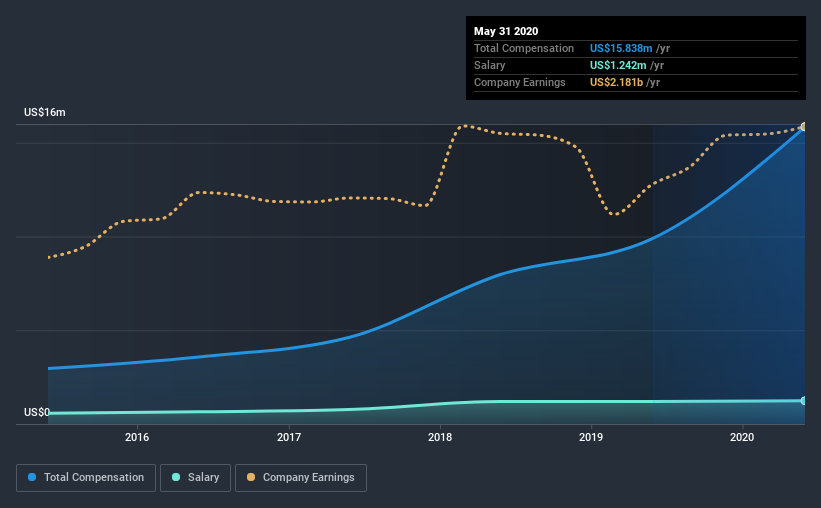Does General Mills' (NYSE:GIS) CEO Salary Compare Well With Industry Peers?

This article will reflect on the compensation paid to Jeff Harmening who has served as CEO of General Mills, Inc. (NYSE:GIS) since 2017. This analysis will also assess whether General Mills pays its CEO appropriately, considering recent earnings growth and total shareholder returns.
See our latest analysis for General Mills
How Does Total Compensation For Jeff Harmening Compare With Other Companies In The Industry?
At the time of writing, our data shows that General Mills, Inc. has a market capitalization of US$38b, and reported total annual CEO compensation of US$16m for the year to May 2020. We note that's an increase of 61% above last year. While we always look at total compensation first, our analysis shows that the salary component is less, at US$1.2m.
For comparison, other companies in the industry with market capitalizations above US$8.0b, reported a median total CEO compensation of US$14m. So it looks like General Mills compensates Jeff Harmening in line with the median for the industry. What's more, Jeff Harmening holds US$19m worth of shares in the company in their own name, indicating that they have a lot of skin in the game.
Component | 2020 | 2019 | Proportion (2020) |
Salary | US$1.2m | US$1.2m | 8% |
Other | US$15m | US$8.7m | 92% |
Total Compensation | US$16m | US$9.9m | 100% |
Speaking on an industry level, nearly 22% of total compensation represents salary, while the remainder of 78% is other remuneration. General Mills sets aside a smaller share of compensation for salary, in comparison to the overall industry. If total compensation is slanted towards non-salary benefits, it indicates that CEO pay is linked to company performance.
General Mills, Inc.'s Growth
General Mills, Inc.'s earnings per share (EPS) grew 8.3% per year over the last three years. It achieved revenue growth of 4.6% over the last year.
We'd prefer higher revenue growth, but we're happy with the modest EPS growth. Considering these factors we'd say performance has been pretty decent, though not amazing. Moving away from current form for a second, it could be important to check this free visual depiction of what analysts expect for the future.
Has General Mills, Inc. Been A Good Investment?
With a total shareholder return of 22% over three years, General Mills, Inc. shareholders would, in general, be reasonably content. But they probably don't want to see the CEO paid more than is normal for companies around the same size.
To Conclude...
As previously discussed, Jeff is compensated close to the median for companies of its size, and which belong to the same industry. However, earnings per share and total shareholder return are solid yet uninspiring. So, although the CEO compensation seems reasonable, shareholders might want to see some further progress before they agree that Jeff should get a raise.
CEO compensation is a crucial aspect to keep your eyes on but investors also need to keep their eyes open for other issues related to business performance. We did our research and spotted 2 warning signs for General Mills that investors should look into moving forward.
Important note: General Mills is an exciting stock, but we understand investors may be looking for an unencumbered balance sheet and blockbuster returns. You might find something better in this list of interesting companies with high ROE and low debt.
This article by Simply Wall St is general in nature. It does not constitute a recommendation to buy or sell any stock, and does not take account of your objectives, or your financial situation. We aim to bring you long-term focused analysis driven by fundamental data. Note that our analysis may not factor in the latest price-sensitive company announcements or qualitative material. Simply Wall St has no position in any stocks mentioned.
Have feedback on this article? Concerned about the content? Get in touch with us directly. Alternatively, email editorial-team@simplywallst.com.

 money
money 
